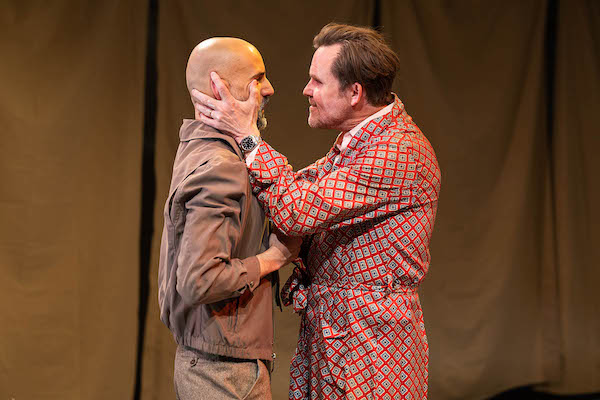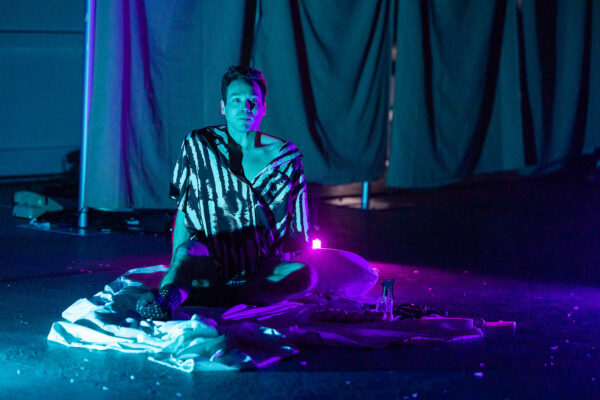Theater Review: “Angels in America” — Inspired Insanity
By David Greenham
This pared-down staging of Tony Kushner’s 30-year-old masterpiece invites some reflection, even a kind of nostalgia. But blazing through — with seraphic force — is the harsh reality of how insane we have become now.
Angels in America, Part 1: Millennium Approaches by Tony Kushner. Directed by Eric Tucker. Scenic design by Deb Sivigny. Lighting design by John R. Malinowski. Costume design by Daniele Tyler Mathews. Sound design by Kai Bohlman. Props design by Karissa Roberts. Produced in partnership between Central Square Theater and Bedlam at Central Square Theater, Cambridge, through May 28.

Nael Nacer and Eric Tucker in Angels in America, Part 1: Millennium Approaches. Photo: Nile Scott Studios
Perhaps the most accurate prediction in Tony Kushner’s 1993 play Angels in America: Millennium Approaches arrives in Act 3. An unnamed woman (Helen Hy-Yuen Swanson, uncredited) announces, “In the new century, we’ll all be insane.”
Director Eric Tucker, the mastermind behind the New York-based company Bedlam, has made a career of upending norms to shape visceral theatrical experiences. In his latest Boston outing he infuses his own idiosyncratic brand of frenzied insanity into Tony Kushner’s masterpiece. The production has been designed to feel hamfistedly devised. The set, lighting, costumes, and props have been selected with an eye to the haphazard: it looks as if they were pulled from someone’s ’80s storage unit and then strewn about the stage.
But don’t be fooled. Though if this be madness, “yet there is method in’t.” The superb ensemble company revels in the raw setting that’s been chosen for this retelling of the notorious story of Prior, Joe and Harper Pitt, Louis, and, of course, Roy Cohn, whose proclivity for lies, vile rhetoric, and blind arrogance has been given new edge now that his real life protégé, Donald Trump, has surfed to prominence on our nation’s current wave of craziness. And he may well be back yanking at the levers of power.

Eric Tucker and Debra Wise in Angels in America, Part 1: Millennium Approaches. Photo: Nile Scott Studi0
For those who are new to this Pulitzer Prize– and Tony Award–winning icon of a play, it’s set in the mid-’80s during the AIDS crisis. The narrative follows the interactions of a series of brilliantly conceived characters — each infected in their own way with the debilitating isolation and self-hatred that came with the dog-eat-dog times and the AIDS crisis.
Roy Cohn (Steven Barkhimer, at the performance I saw) is a successful New York lawyer, an unabashed master of deception, and a hypocrite: he is a “heterosexual man, who fucks around with guys.”
Mormon Joe Pitt (Nael Nacer) is a self-loathing chief clerk in the Federal Court of Appeals. His wife Hannah Pitt (Kari Buckley) is depressed, frightened of everything, and addicted to valium. Louis Ironson (Zach Fike Hodges) works as a word processor in the Court of Appeals. His boyfriend, Prior Walter (Eddie Shields), is a part-time designer with a small trust fund. It’s Prior who supplies the first intimation of the zeitgeist’s doom when he reveals his lesion to Louis. “The wine-dark kiss of the angel of death,” he says, with fake indifference.
The years have not tarnished the brilliance of Angels in America. The language is vibrant, clear, and interwoven with poetic deftness. It is now 30 years old, but in many ways it’s even better — and more revelatory about American lunacy — than it was before. After all, we have all just gone through a deadly pandemic that has yet to fully end.

Maurice Emmanuel Parent and Kari Buckley in Angels in America, Part 1: Millennium Approaches. Photo: Nile Scott Studios
The stark yet intimate setting of the production adds to the drama’s explosiveness. Scenes are private yet wide open. Moments of oversized theatricality invite microscopic examination.
The production, which runs three-and-a-half hours with two intermissions, isn’t long, nor does it feel rushed. Scenes are pressed up against one another; the mood can drastically change with a breath or a quiet word.
The setting is a kind of cluttered warehouse with a concrete floor. Fabric hangs on the two sides. Save for the chaotic opening sequence, when Cohn, sitting in a rolling chair, clumsily zips around the space to answer his many phone lines, most of the scenes move from one to the other via the sudden announcement of a location — a synagogue, the Pitts’ apartment, a hospital room, and so on. One design element is particularly successful: the use of hand-held lighting and flashlights to lead us into the play’s most intimate scenes. Lighting, sound, costumes, and props are adroitly chosen to hold us steady as we travel through the roller-coaster narrative.
Obviously, Tucker’s success depends on how deeply his actors buy into the concept. They are razor sharp and laser focused. Joe (Nacer) and Harper (Buckley) Pitt are seldom together in the play, but both actors make their intertwined stories compelling, emotionally transparent.
Louis (Fike Hodges) is given the difficult task of linking all of the play’s characters. Hodges is especially strong in his third act confrontation with Belize (a delightful Maurice Emmanuel Parent, who also doubles as Mr. Lies). Barkhimer’s Cohn lacks sufficient doses of sleaze (no doubt falling way short of his real life model), but the fact is that the over-the-top Cohn will inevitably be curtailed in such a radically pared-down production. His energy and attitude is driven by excess.

Eddie Shields in Angels in America, Part 1: Millennium Approaches. Photo: Nile Scott Studios
The spotlit characters are given firm support by Debra Wise as Hannah Pitt, Ethel Rosenberg, a rabbi, and Cohn’s doctor. She handles all these roles with chameleonic aplomb. And Helen Hy-Yuen is wonderful as the nurse, as well as the climax-stealing angel.
But it is Eddie Shields, as Prior, who shines the brightest in this production. He’s at miraculous ease in the role, skillfully chronicling how Prior floats and later painfully twists to his final moment, when the “great work begins.” The performer’s decline into illness and later madness is parsed with unnerving nuance: this is a beautifully conceived portrait.
Tucker and his Bedlam team, in partnership with Central Square Theater, have created a powerful yet intimate epic. Yes, the staging invites some reflection on the past, even a kind of nostalgia. But blazing through — with seraphic force — is the harsh reality of how insane we have become now.
David Greenham is an adjunct lecturer of Drama at the University of Maine at Augusta, and is the executive director of the Maine Arts Commission. He has been a theater artist and arts administrator in Maine for more than 30 years.
Tagged: Angels in America: Millennium Approaches, Bedlam, Central Square Theatre

So grateful to see this excellent production so well reviewed. Over the past few years I’ve become a big Bedlam fan (“Twelfth Night,” “Saint Joan,” “Hamlet,” “The Crucible”). Their stripped-down productions are always performed by a handful of actors in multiple roles — in “Twelfth Night,” this was sometimes accomplished with the “quick-change” of exchanging hats mid-scene. They’re just amazing. I thought this production could have been confusing to people who had never seen the play, but the audience seemed all-in.
Thanks, Jon. It’s so important for theaters to realize the great value of collaboration and cooperation. The Bedlam/Central Square partnership, along with the other Bedlam partnerships in Boston, have helped bring even more wonderful productions and theater makers to the city. Although I suspect that Bedlam opening their own space in NY might reduce the opportunities for them to spend time in Boston, there are many other wonderful companies around the country (and the globe) who might be likely partners for productions in town to augment and inspire the terrific homegrown theater that’s going on.